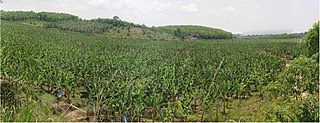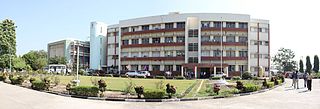Related Research Articles

The economy of Rwanda has undergone rapid industrialisation due to a successful governmental policy. It has a mixed economy. Since the early-2000s, Rwanda has witnessed an economic boom, which improved the living standards of many Rwandans. The Government's progressive visions have been the catalyst for the fast transforming economy. The President of Rwanda, Paul Kagame, has noted his ambition to make Rwanda the "Singapore of Africa".
Bharathidasan Institute of Management, Tiruchirappalli is an Indian business school established in 1984 in Trichy, Tamil Nadu, India. The school offers AICTE approved full-time MBA program, doctoral programs, and many executive education programs. The college is often ranked among the well known Business Schools of the country ever since its inception.

The U.S. African Development Foundation (USADF) is an independent U.S. government agency established by Congress in 1980 to invest directly in African grassroots enterprises and social entrepreneurs. USADF's investments aim to increase incomes, revenues, and jobs by promoting self-reliance and market-based solutions to poverty. USADF targets marginalized populations and underserved communities in the Sahel, Great Lakes, and the Horn of Africa. It partners with African governments, other U.S. government agencies, private corporations, and foundations to achieve transformative results.

Maraba coffee is grown in the Maraba area of southern Rwanda. Maraba's coffee plants are the Bourbon variety of the Coffea arabica species and are grown on fertile volcanic soils on high-altitude hills. The fruit is handpicked, mostly during the rainy season between March and May, and brought to a washing station in Maraba, where the coffee beans are extracted and dried. At several stages, the beans are sorted according to quality. The farmers receive credits based on the amount and quality of the beans they provide.

Mount Huye is a mountain located near to the city of Butare in southern Rwanda. It is connected by a ridge to Nyungwe Forest to the west, and is on the outer edges of the Albertine Rift, the western branch of the East African Rift. The mountain is an important source of mineral water, supplying both the Huye bottled water brand sold throughout Rwanda and the nearby Maraba fair trade coffee plant, whose washing station receives Huye water via a pipeline built using ACDI/VOCA funding in 2002.

Luigi Lavazza S.p.A., shortened and stylized as LAVAZZA, is an Italian manufacturer of coffee products. Founded in Turin in 1895 by Luigi Lavazza, it was initially run from a small grocery store at Via San Tommaso 10. The business is currently administered by the third and fourth generations of the Lavazza family.

The Philippines' Bureau of Agricultural Research, is an agency of the Philippine government under the Department of Agriculture responsible for ensuring that all agricultural research is coordinated and undertaken for maximum utility to agriculture.

Agriculture was the foundation of the economy in Ivory Coast and its main source of growth. In 1987 the agricultural sector contributed 35 percent of the country's GDP and 66 percent of its export revenues, provided employment for about two-thirds of the national work force, and generated substantial revenues despite the drop in coffee and cocoa prices. From 1965 to 1980, agricultural GDP grew by an average 4.6 percent per year. Growth of agricultural GDP from coffee, cocoa, and timber production, which totaled nearly 50 percent of Ivory Coast's export revenues, averaged 7 percent a year from 1965 to 1980.

Coffee production has been a major source of income for Vietnam since the early 20th century. First introduced by the French in 1857, the Vietnamese coffee industry developed through the plantation system, becoming a major economic force in the country. After an interruption during and immediately following the Vietnam War, production rose once again after Đổi mới economic reforms, making coffee second only to rice in value of agricultural products exported from Vietnam.

Agricultural marketing covers the services involved in moving an agricultural product from the farm to the consumer. These services involve the planning, organizing, directing and handling of agricultural produce in such a way as to satisfy farmers, intermediaries and consumers. Numerous interconnected activities are involved in doing this, such as planning production, growing and harvesting, grading, packing and packaging, transport, storage, agro- and food processing, provision of market information, distribution, advertising and sale. Effectively, the term encompasses the entire range of supply chain operations for agricultural products, whether conducted through ad hoc sales or through a more integrated chain, such as one involving contract farming.
These are some of the articles related to Rwanda on the English Wikipedia pages:
The Kalinga State University is a state university in the Philippines. It is mandated to provide advance institutions in arts, agricultural and natural sciences as well as in technological and professional fields. Its main campus is located in Tabuk, Kalinga.

The International Growth Centre (IGC) is an economic research centre based at the London School of Economics, operated in partnership with University of Oxford's Blavatnik School of Government.
Indian Institute of Rice Research formerly Directorate of Rice Research or IIRR is a rice research institute located in Rajendranagar near Hyderabad, Telangana.
Crops For the Future, known by its acronym CFF, is an independent international organisation with a mandate to promote and facilitate the greater use of neglected and underutilised crops for enhanced diversification of agricultural systems and human diets, particularly for the benefit of poor people in developing countries. Crops for the Future is the only such organisation exclusively dedicated to an agenda increasingly recognised as important to achieving food security in a sustainable manner and making use of local agricultural biodiversity. Crops for the Future is based in Semenyih, Malaysia, and is governed by a Board of Directors, including a representative of the Government of Malaysia.
Community Coffee is a coffee roaster and distributor based in Baton Rouge, Louisiana, United States. As of 2005, it was the largest family-owned coffee brand in the United States, controlling 52% of the market in South Louisiana and 72% in Baton Rouge, and employing 850 people. The company has distribution throughout markets in the Southeastern United States.

The Central Institute of Agricultural Engineering (CIAE) is a higher seat of learning, research and development in the field of agricultural engineering, situated in the lake city of Bhopal, Madhya Pradesh, India. It is an autonomous body, an Indian Council of Agricultural Research subsidiary, under the Ministry of Agriculture & Farmer's Welfare, Government of India.

ICAR - Directorate of Groundnut Research (ICAR-DGR) formerly known as National Research Centre for Groundnut is a premier national level institute set up by the Indian Council of Agricultural Research, Ministry of Agriculture of India to cater to the needs of agricultural science research in the field of groundnut (peanut) crop in India. ICAR-DGR was established in 1979, Gujarat to give a fillip to research for enhancing productivity of groundnut in keeping with its importance among the oilseed crops of India. The research centre came into being as the first crop commodity research unit under the category of NRC's of the Indian Council of Agricultural Research, as an autonomous body set up as a registered society. The National Research Centre on Groundnut (NRCG) was elevated to the level of a Directorate in the year 2009 and rechristened as the Directorate of Groundnut Research.

The African Forum for Agricultural Advisory Services (AFAAS), is a continental organization for strengthening Agricultural Extension and Advisory Services (AEAS) in Africa. It operates within the framework of the Comprehensive Africa Agriculture Development Programme (CAADP), a venture of the African Union in the New Partnership for Africa's Development (NEPAD). AFAAS is an autonomous subsidiary of the Forum for Agricultural Research in Africa (FARA).
Science and technology in Uganda examine government efforts to develop a national innovation system and the impact of these policies.
References
- ↑ "Coffee rebound perking up Rwanda's economy | the Seattle Times".
- ↑ https://www.gafspfund.org/sites/default/files/inline-files/Rwanda_StrategicPlan.pdf [ bare URL PDF ]
- ↑ "Evaluation of the PEARL Project- Partnership for Enhancing Agriculture in Rwanda through Linkages". www.aiaee.org. Retrieved 2022-04-17.
- ↑ "World Coffee Research | Dr. Timothy Schilling: A Life in Coffee". World Coffee Research. Retrieved 2022-04-17.
- ↑ "Rwanda to the World: Celebrating 10 years of Rwandan Specialty Coffee | Mercanta" . Retrieved 2022-04-17.
- ↑ "White Paper: Cupper's Guide - Rwanda". Union Coffee. Retrieved 2022-04-17.